Seattle Now: Local designer aims to turn Seattle into fashion hot spot
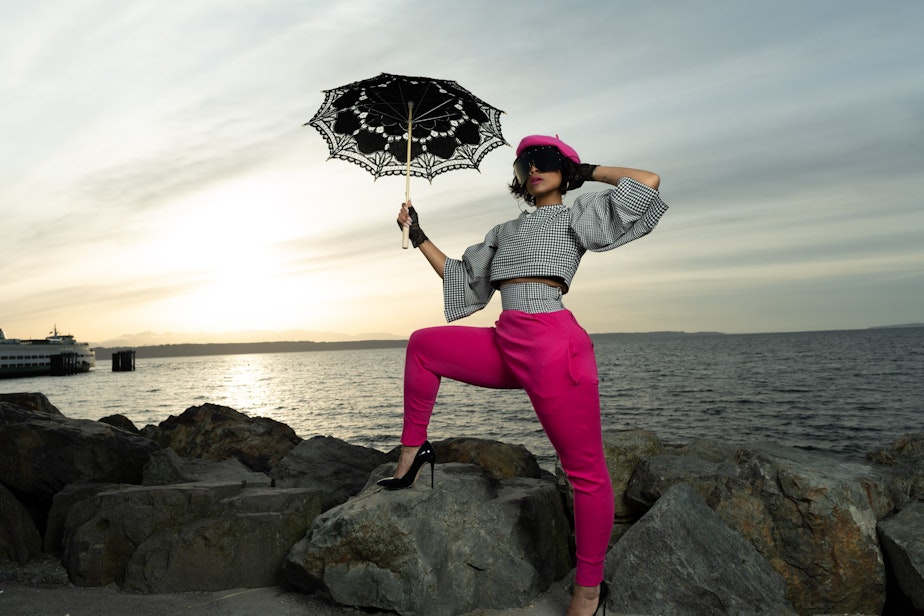
Jamen Lanogwa Saziru believes there's hope for Puget Sound style beyond fleece and flannel.
In our bike commuter and bus rider filled city, where people tend to be more comfortable in socks with sandals than a pair of heels, fashion designer Jamen Lanogwa Saziru is an unexpected visionary.
In this episode of Seattle Now, we join host Patricia Murphy and Saziru to explore the connection between style and identity, and to hear more about why this up-and-coming creator thinks Seattle is the perfect place to launch a fashion renaissance.
Sponsored
We'll also hear from local transgender consultant Spencer Bergstedt and White Center listener Ryan Arnold.
The transcript below has been edited for clarity.
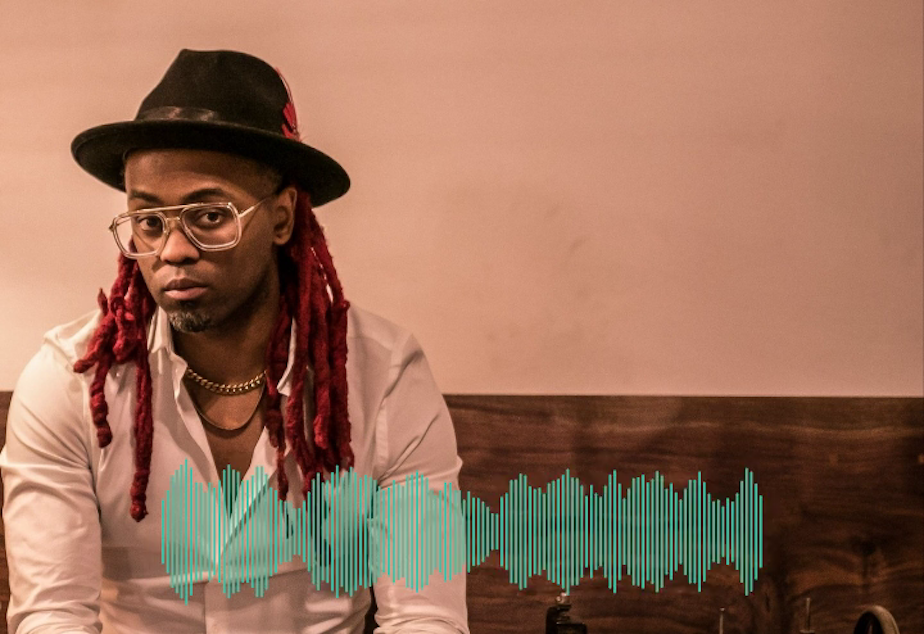
 2 mins
Fashion designerJamen Lanogwa Saziru says the pandemic lockdown freed him to create the designs he's always dreamed of.
2 mins
Fashion designerJamen Lanogwa Saziru says the pandemic lockdown freed him to create the designs he's always dreamed of.
Sponsored
PATRICIA MURPHY: We're all emerging from lockdown. And some of us, well, I'll speak for myself, are wondering how the heck I'm supposed to dress after all of this?
I'm not even joking. I've been rotating exactly five T-shirts to zip up sweatshirts and a couple of pairs of jeans this entire time. Just ask my producers, it's been glorious. But even I know this isn't gonna work for me for the long-term. I'm a professional — whatever that means.
And for some Seattleites, their post-pandemic style is about more than looking the part — it's about identity. For today's show, we're going to hear from a couple of Seattle style makers about the future of fashion and representation in our city.
And here's a hint, you're definitely going to want to see what we're talking about. You can find some very stylish bonus photos and stories on our Instagram page.
Joining me today is local fashion designer Jamen Lanogwa Saziru, along with KUOW producer Kristin Leong, to talk about how our city is reckoning with pandemic style.
Sponsored
Jamen, great to have you.
JAMEN SAZIRU: Miss Trish, honored to be here.
PATRICIA MURPHY: Thank you, honored to have you. Kristin, good to talk to you again. Speaking of fashion, you have a fantastic fashion sense. You always look great.
KRISTIN LEONG: Oh snap. Thanks, Trish. It's always great to be here with you.
PATRICIA MURPHY: Oh, good to have you. For real. Jamen, I am not going to lie. I relish in the socks-and-sandals Pacific Northwest stereotype. But I absolutely appreciate other people's style. Why are the clothes we wear an important conversation to have right now?
Sponsored
JAMEN SAZIRU: They're very, very important. I feel like the things you were definitely speak for you, even if you never speak at all. So with that being said, it's very, very important.
Your outward appearance results directly in how people speak to you, how people treat you. I feel like it's always a really good thing to put effort and thought into what you wear, [and] how you wear it. And I learned that from a very young age. My parents always said, "Always look good wherever you go, even if you go into bed."
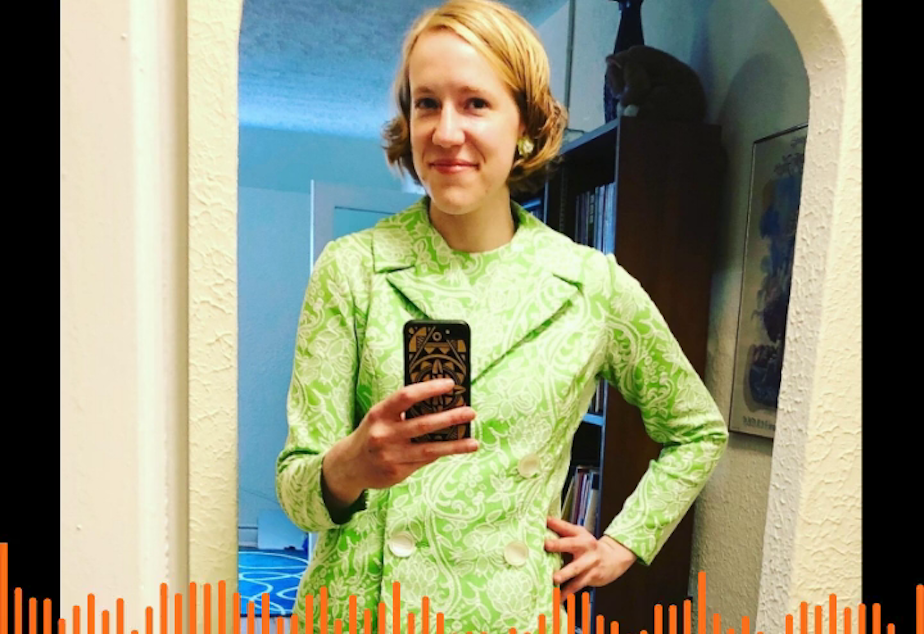
 1 min
MOHAI Curator of Collections and fashion historian Clara Berg says that writing off fashion as "frivolous" is rooted in misogyny and xenophobia.
1 min
MOHAI Curator of Collections and fashion historian Clara Berg says that writing off fashion as "frivolous" is rooted in misogyny and xenophobia.
PATRICIA MURPHY: I'll say this, as an older white woman now, I am more challenged in my life than I have ever been when it comes to fashion because I really feel like I do get a pass. Like I don't have to necessarily dress up to get treated well.
JAMEN SAZIRU: No matter what your level is, your style elevates you no matter what. If you iron that shirt, you're going to be accepted a little bit differently than if you don't... [it] kind of doesn't matter about race in this particularly. But I do see your point in which you're trying to make.
Sponsored
PATRICIA MURPHY: It does feel fantastic to put on a well-fitting, good-looking outfit. I think everybody can identify with putting something on and knowing you're going where you want to be with this now and that feels good.
JAMEN SAZIRU: I mean, I don't step out on the runway every day. But when I do get fly and I step out — I walk differently. My back's more erect, my chin's up and people respond to that. Plain and simple.
PATRICIA MURPHY: You chose Seattle intentionally to start your fashion career. Why did you choose Seattle?
JAMEN SAZIRU: I'm not trying to talk trash. But let's be real. All Seattleites, they say the same thing to me. "We need help. Can you help me?" So it's not about trying to put Seattle down. Y'all know y'all need some help out here!
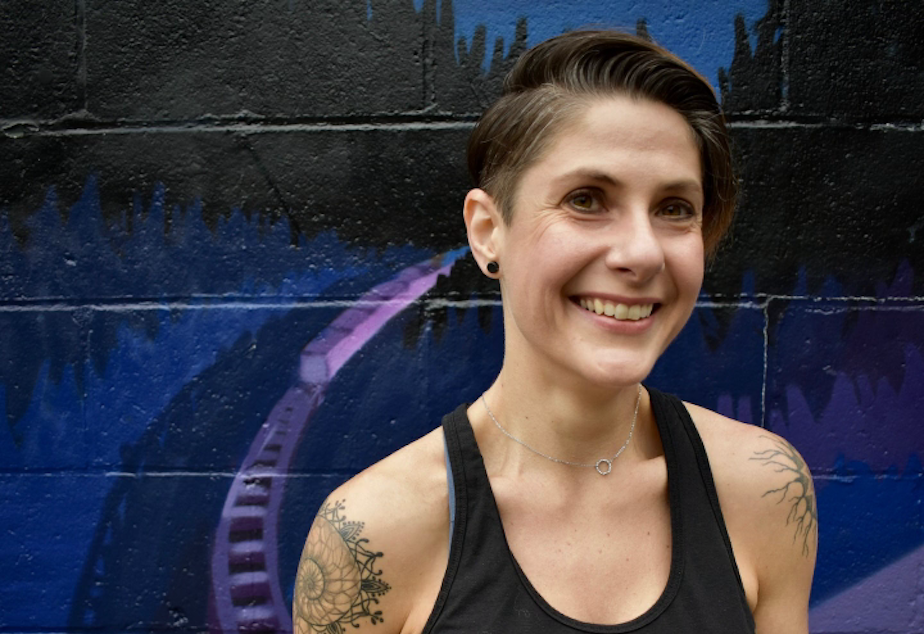
 1 min
Central District resident and mental heath care provider Ana Paula Pessotto says that working from home during the pandemic gave her wife a new view into her professional life, and also gave her clients a glimpse into her queer identity.
1 min
Central District resident and mental heath care provider Ana Paula Pessotto says that working from home during the pandemic gave her wife a new view into her professional life, and also gave her clients a glimpse into her queer identity.
Sponsored
PATRICIA MURPHY: Like we've talked about clothes for me are more of a spectator sport. But for a lot of people, they are a way to express their identity.
And Kristin, you talked with people from Seattle's LGBTQ community, and for some people, there's a lot more to fashion than just putting on clothes, right?
KRISTIN LEONG: Absolutely. You know Trish, for many of us in our queer community style is tied so deeply to who we are.
And I was thinking back to when the pandemic first started. I felt like I could hear this collective groan from masculine-of-center lesbians everywhere who were worried that with barbershop and salon closures, they weren't gonna be able to keep up their undercuts.
Lucky for my dapper wife though, I did learn some new skills in the pandemic and I am excellent, apparently, with a pair of clippers.
But in fact, this hasn't been the case for everybody. What we're about to hear is a clip from Spencer Bergstedt. And I should note here that Spencer is a transgender man, and he works as a consultant making sure our workplaces are more inclusive for trans folks.
SPENCER BERGSTEDT: Absolutely. I think so much of how we express ourselves as queers is about how we dress, how we style our hair, what we do with our facial and body hair.
We signal so much to one another through how we dress, you know butches signal to femmes, femmes signal to butches, gay men signal to each other about whatever sub-part of the community that they're in, and to not have that available feels like a piece of your identity has been stripped away.
It's a little bit like going back in the closet, not to necessarily use clothing-related terminology, but it really is a bit like going back in the closet.
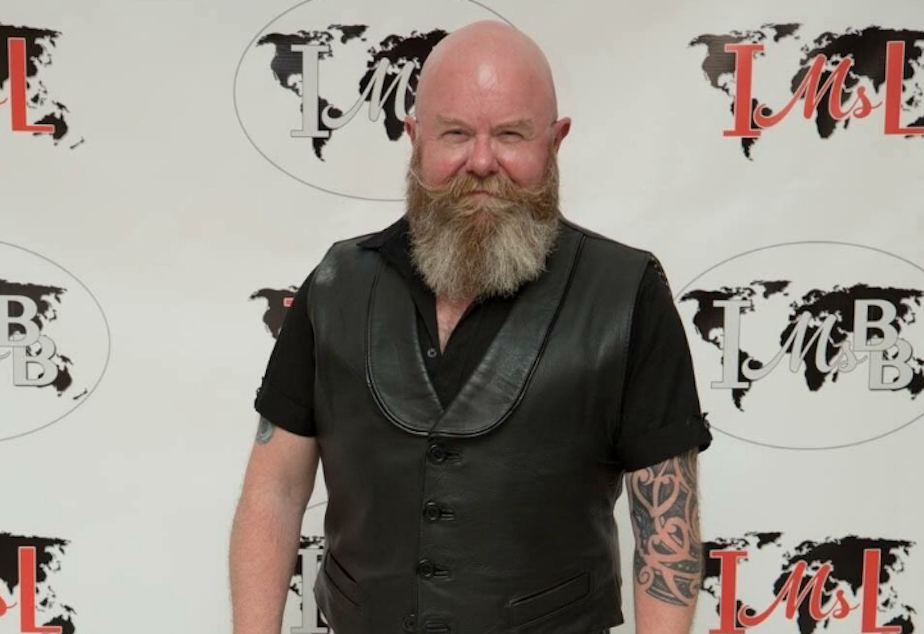
 1 min
Seattle-based transgender consultant Spencer Bergsteadt says that for queer people, fashion and presentation is about more than just style.
1 min
Seattle-based transgender consultant Spencer Bergsteadt says that for queer people, fashion and presentation is about more than just style.
PATRICIA MURPHY: Fascinating, Kristin.
KRISTIN LEONG: It's interesting to think about fashion being not just, you know, this vehicle for expressing ourselves, but also how we signal and connect with other people.
PATRICIA MURPHY: Right? Like I would put an outfit on to look professional, but that's about me and my job less about me as a person, right? Because if you want to see me as a person, check out my flip flops. My T-shirt collection.
You know, Jamen, we are Zooming here. But describe your look for our listeners today. And what do you hope to be signaling to others with your style?
JAMEN SAZIRU: I thought you'd never ask, I wanted people to imagine how I look today, I guess. I guess we go from head to toe. I'm wearing a chocolate colored flat-brim fedora, the chocolate hat definitely blends in with my chocolate skin. Red dreadlocks, which is my accent piece, so even if I'm wearing all black, so I have an accent piece going on.
PATRICIA MURPHY: They're beautiful, by the way.
JAMEN SAZIRU: Oh my gosh, thank you. A simple sweatshirt pressed as always, ripped skinny jeans, and I have on some pretty cool Air Force 1s. So it's a casual day, I want to look like I'm enjoying the sun with without me having to walk up and tell somebody I am.
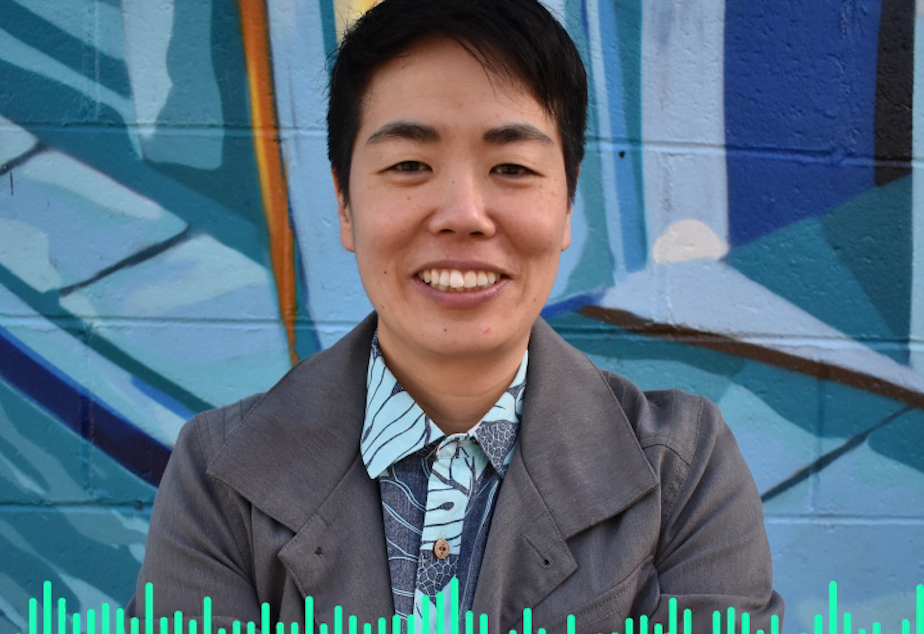
 1 min
Central District resident Jen Yoshimura says that during the pandemic she wore a lot of hats, because although she loves her wife, she doesn't trust her to cut her Japanese and Hawaiian hair.
1 min
Central District resident Jen Yoshimura says that during the pandemic she wore a lot of hats, because although she loves her wife, she doesn't trust her to cut her Japanese and Hawaiian hair.
PATRICIA MURPHY: You know, masks became part of our looks as well for some people. And I know it helped me as an introvert; putting on that mask actually felt very comforting for a while.
And Kristin, you heard from a man in White Center whose style didn't change much over the pandemic, but masking, he discovered something about himself as well.
KRISTIN LEONG: Okay, we're about to hear from Ryan Arnold. And I have to say I have known Ryan for decades. He's an old friend of mine. And you have to picture Ryan before you hear his voice.
Okay, shaved head, full beard, lots of tattoos. He very much looks like this skateboarder that he is. I asked Ryan how he would describe his style. And he said, "I wear all black." And I was like yeah, but what people need to understand is that it also looks like you might be on your way to do a crime at any time.
So picture Ryan when you hear this clip. Apparently the pandemic hasn't changed his ideas about fashion, but the mask mandate did have a surprising effect on him.
RYAN ARNOLD: We were forced to wear masks. And the only way to look at somebody was full-on eye contact.
I feel like that made us all more human and did kind of made us all let our guard down a little bit when it comes to just random interactions on the street or just how you're feeling we have eye contact.
I feel like that is making us more human. Which, you know, whether it's softer, or more empathetic, whatever it is. Even me — I'm a little bit softer.
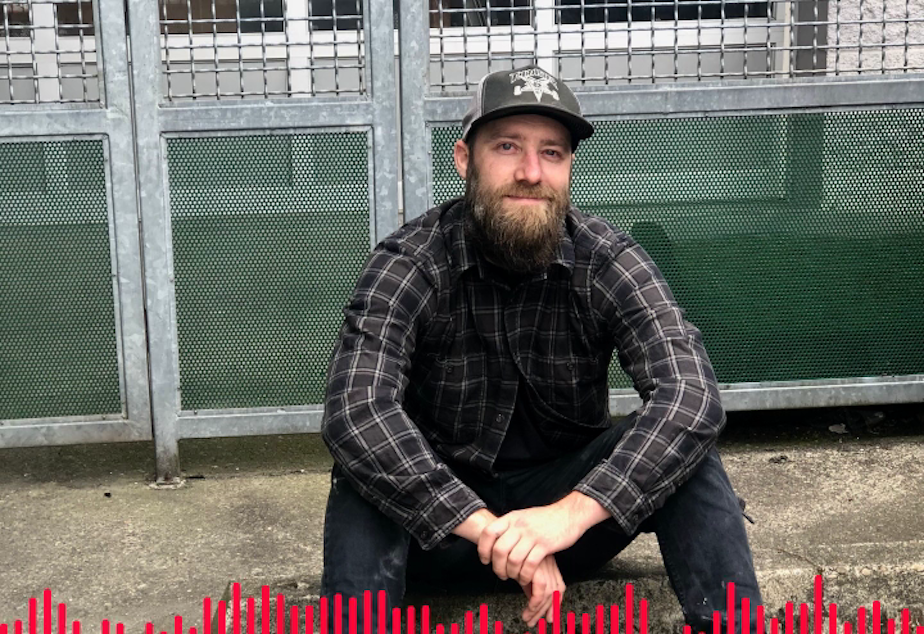
 1 min
White Center resident Ryan Arnold says that pandemic mask wearing has made everyone a little more human, even him.
1 min
White Center resident Ryan Arnold says that pandemic mask wearing has made everyone a little more human, even him.
PATRICIA MURPHY: I'm with Ryan on that one, I feel a little bit softer, too. And you know, I don't think we're alone.
The last year and a half has had a transformative effect on a lot of people. You know, what about you, Jamen? I know your last two fashion shows were canceled because of the pandemic. What has the lockdown been like for you as a creator?
JAMEN SAZIRU: I've had a lot more time to create and to be myself.
Initially, when I first started, I was creating a lot of designs that I felt like was very safe. But I did have designs, I had sketches in my brain. So with the last couple years to work and elevate, I've been putting those designs that were only in my head into actual gowns, and actually jackets and dresses and pants and things of that nature. And they've been accepted really well.
So it built up a lot of confidence in me. It was just something about me being scared of how good I could possibly be. Now I'm at the point where okay, people like Jamen for what he is, not for what we think he should make for us.
PATRICIA MURPHY: That must be very freeing.
JAMEN SAZIRU: Definitely. As artists, we want to be free. Making art is all about freedom. And I love what I do, because I can create art for everyone. Because if you think about it, and not to knock down anybody, but if you if you're a painter, there's only a certain amount of people who buy paintings. But I don't know anyone who who doesn't wear clothes.
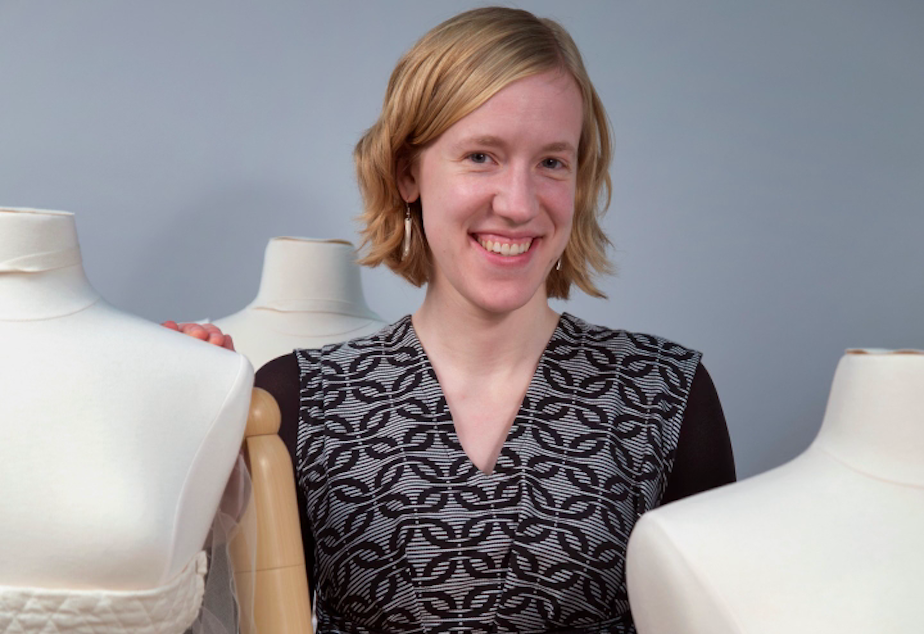
 1 min
In 2019 fashion historian Clara Berg curated an exhibit for MOHAI called Seattle Style: Fashion/Function. Surprisingly, she said many people reacted with anger. She noticed two main reasons for the strong reactions.
1 min
In 2019 fashion historian Clara Berg curated an exhibit for MOHAI called Seattle Style: Fashion/Function. Surprisingly, she said many people reacted with anger. She noticed two main reasons for the strong reactions.
PATRICIA MURPHY: Well, I think Seattle might be in for a fashion renaissance post-pandemic. And I am curious, what you both think Seattle's post-pandemic style could look like?
KRISTIN LEONG: Well, I'm personally looking forward to Jamen leading the way here, Jamen could be our renaissance leader. That's what I'm looking forward to.
I am predicting that post-pandemic, even Seattle, but all over, that we are going to be super tailored. That after a year and a half of soft pants, we are done. We are done with that. That's my prediction.
JAMEN SAZIRU: Let's be real. There's gonna be a lot of Seattleites who are set in their ways like this is who we are, we're going to wear sweatpants, we're going to go hiking, we're going to you know, Patagonia, or whenever.
But there is a huge amount of people that are ready for a change. And, Kristin, yeah, I would love to be that Renaissance man.
PATRICIA MURPHY: I think that's what I'm getting from you that it's actually more important to do well with what you like. To put it out in its best way, iron it!
I might buy an iron, Jamen. I'm not sure.
JAMEN SAZIRU: Oh, wait. I will Venmo you... how much does it cost? I will help this.
PATRICIA MURPHY: I haven't owned an iron or an ironing board in 21 years!
JAMEN SAZIRU: My soul is hurting!
PATRICIA MURPHY: You know what my secret is? This is how I do it. Oh my gosh, I'm telling you this... you're gonna fall out of your chair... I take a nice damp washcloth and I throw it in the dryer with the item. And I just freshen it.
KRISTIN LEONG: That sounds like a public radio fashion hack, Trish!
PATRICIA MURPHY: Oh my gosh!
Alright. Let me get one piece of advice for you from you, Jamen, before we go.
For all the people listening who are willing to put in the effort now who have been sitting at home wearing shorts for a year. What can they do?
JAMEN SAZIRU: It's not even hard. It's just about paying more attention and be more concerned because your look, your style says a lot.
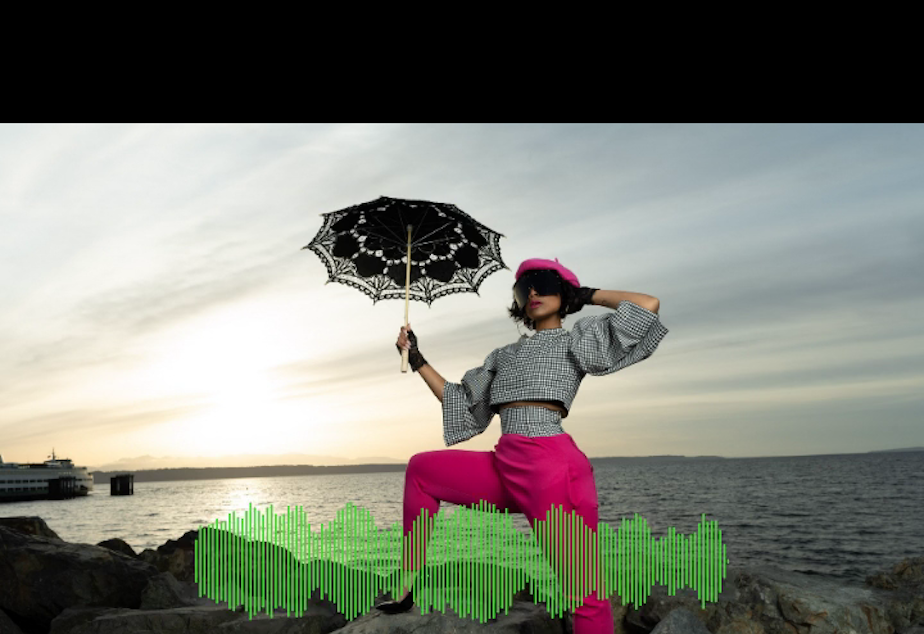
 1 min
Local fashion designer Jamen Lanogwa Saziru on his muse, Audrey Hepburn, and how Breakfast at Tiffany's influences his work.
1 min
Local fashion designer Jamen Lanogwa Saziru on his muse, Audrey Hepburn, and how Breakfast at Tiffany's influences his work.
PATRICIA MURPHY: My guest today were local fashion designer Jamen Lanogwa Saziru and KUOW producer Kristin Leong.
Jamen, thanks for joining us.
JAMEN SAZIRU: My pleasure, anytime.
PATRICIA MURPHY: Kristin, great to have you back.
KRISTIN LEONG: Thank you, Trish.
PATRICIA MURPHY: In this episode, we also heard from consultant Spencer Bergstedt, and White Center listener Ryan Arnold.
Kristin Leong produced today's show with editing support from Clare McGrane.
Our production team also includes Jason Pagano, Caroline Chamberlain Gomez, Jennie Cecil Mooore, Matt Martin and Diana Opong.
To get a look at the style icons behind today's episode, head on over to our Instagram. We're @seattlenowpod. Tag us in your selfies and let us know if you're still wearing your soft pants after all this is over.
Matt Jorgensen does our theme music.
I'm Patricia Murphy. See you tomorrow.
Want more Seattle Now? Follow us on Instagram @seattlenowpod, or send us mail at seattlenow@kuow.org.
Is your personal style changing through this pandemic? Do you have a love letter for any of our fashionable guests? Send our producer a message at kleong@kuow.org or find her on Instagram @leongstagram. Or just head over to the side of this page and click the feedback button. We're listening and our ironing boards are ready.





